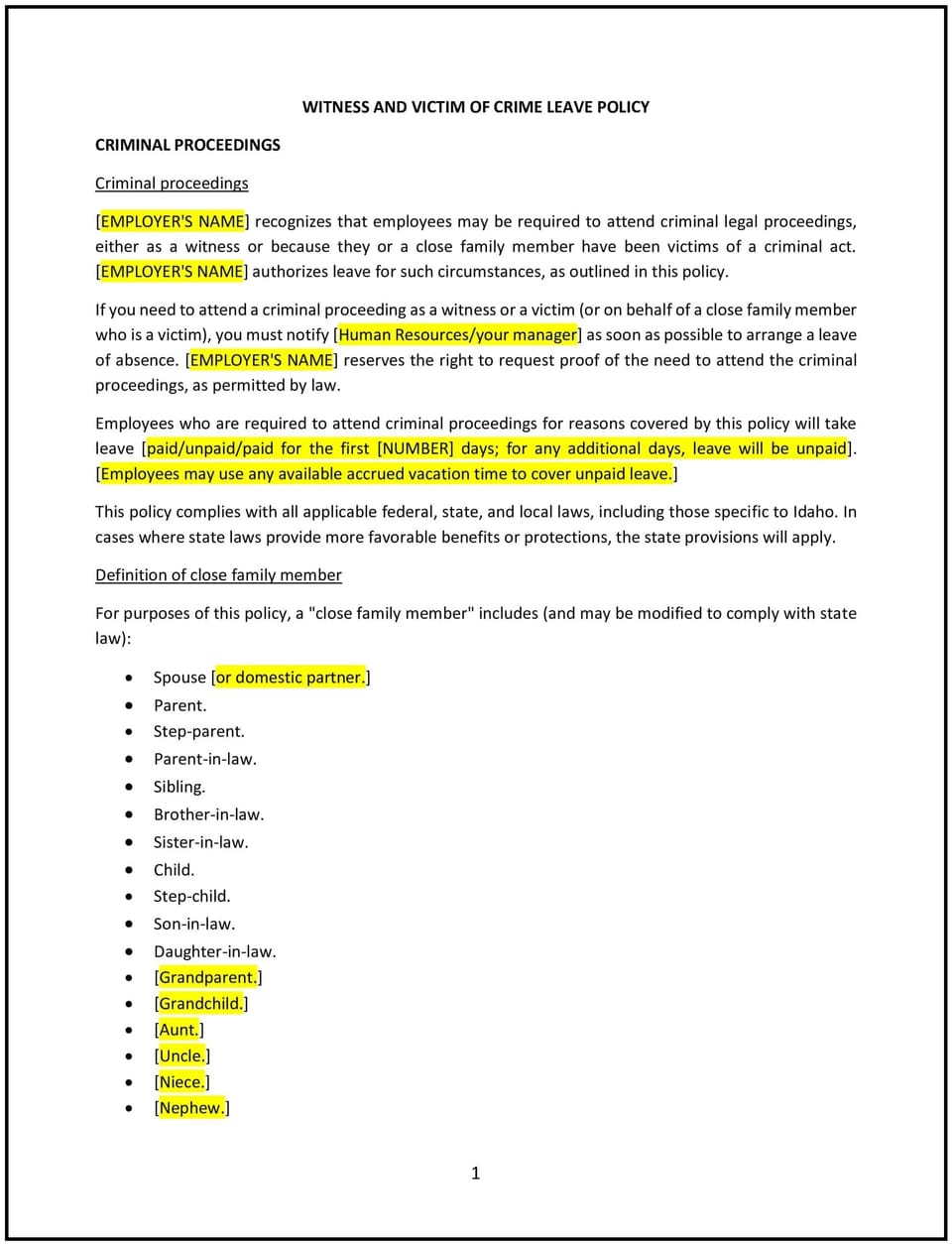Witness and victim of crime leave policy (Idaho): Free template

Witness and victim of crime leave policy (Idaho)
A witness and victim of crime leave policy helps Idaho businesses establish guidelines for employees who need time off to participate in legal proceedings or recover from being a victim of a crime. This policy outlines the types of leave available, eligibility criteria, and the process for requesting and approving leave. It also emphasizes the business’s commitment to supporting employees during challenging times.
By implementing this policy, businesses can demonstrate empathy, protect employee rights, and foster a supportive workplace culture.
How to use this witness and victim of crime leave policy (Idaho)
- Define leave purposes: Specify the types of situations covered by the policy, such as attending court hearings, testifying as a witness, or recovering from being a victim of a crime, to ensure clarity and consistency in applying the policy.
- Establish eligibility criteria: Outline which employees are eligible for leave, such as full-time or part-time workers, and any requirements, such as providing documentation or advance notice.
- Set request procedures: Provide clear instructions for employees to request leave, including required documentation, approval processes, and timelines.
- Address pay during leave: State whether leave will be paid or unpaid, including any use of accrued paid time off (PTO) or other benefits.
- Ensure job protection: Reassure employees that their job will be protected during leave, as required by Idaho and federal laws.
- Communicate benefits continuation: Explain how benefits, such as health insurance, will be handled during leave, including any employee contributions required.
- Train managers: Provide training for managers on how to handle leave requests, maintain confidentiality, and support employees during their absence and return to work.
- Review and update the policy: Periodically assess the policy’s effectiveness and make adjustments based on changes in business needs, employee feedback, or Idaho laws.
Benefits of using this witness and victim of crime leave policy (Idaho)
This policy offers several advantages for Idaho businesses:
- Supports employee well-being: Providing leave for legal proceedings or recovery demonstrates the business’s commitment to supporting employees during difficult times.
- Enhances workplace morale: Employees appreciate businesses that prioritize their needs, leading to higher job satisfaction and loyalty.
- Reduces legal risks: Clear guidelines help businesses comply with Idaho and federal laws regarding leave for victims and witnesses of crime, minimizing the risk of disputes or penalties.
- Promotes inclusivity: The policy reflects the business’s dedication to creating a supportive and inclusive workplace for all employees.
- Builds trust: Offering leave for victims and witnesses of crime fosters trust and strengthens the relationship between employees and the business.
- Encourages accountability: Clear expectations and consequences help employees understand their responsibilities and the importance of adhering to the policy.
Tips for using this witness and victim of crime leave policy (Idaho)
- Communicate the policy clearly: Share the policy with employees during onboarding and through internal communication channels to ensure awareness and understanding.
- Train managers: Provide training for managers on how to handle leave requests, maintain confidentiality, and support employees during their absence and return to work.
- Monitor leave requests: Keep track of leave requests to ensure consistency and fairness in applying the policy.
- Review legal updates: Stay informed about changes to Idaho and federal laws regarding leave for victims and witnesses of crime and update the policy as needed.
- Encourage transparency: Foster open communication with employees about their leave options and the support available to them.
- Document everything: Maintain records of leave requests, approvals, and any correspondence to ensure accountability and compliance.
Q: Why should Idaho businesses have a witness and victim of crime leave policy?
A: A witness and victim of crime leave policy provides clear guidelines for employees who need time off to participate in legal proceedings or recover from being a victim of a crime, demonstrating the business’s commitment to supporting employees during challenging times.
Q: What types of situations should businesses cover in the policy?
A: Businesses should cover situations such as attending court hearings, testifying as a witness, or recovering from being a victim of a crime.
Q: Are businesses required to provide paid leave for victims and witnesses of crime in Idaho?
A: Idaho law does not require businesses to provide paid leave for victims and witnesses of crime. However, businesses should clearly state their pay practices in the policy, whether it’s unpaid leave or the use of PTO.
Q: How should businesses handle job protection during leave?
A: Businesses should reassure employees that their job will be protected during leave, as required by Idaho and federal laws, and outline the process for returning to work.
Q: What steps should businesses take to support employees returning from leave?
A: Businesses should provide a smooth transition back to work, including flexible scheduling, updated training, and open communication to address any concerns.
Q: How can businesses ensure fairness in applying the policy?
A: Businesses should apply the policy consistently, provide clear communication, and document all leave requests and approvals to ensure fairness and transparency.
Q: How often should businesses review their witness and victim of crime leave policy?
A: Businesses should review the policy annually or as needed to ensure it aligns with current Idaho and federal laws, business needs, and workforce dynamics.
This article contains general legal information and does not contain legal advice. Cobrief is not a law firm or a substitute for an attorney or law firm. The law is complex and changes often. For legal advice, please ask a lawyer.


